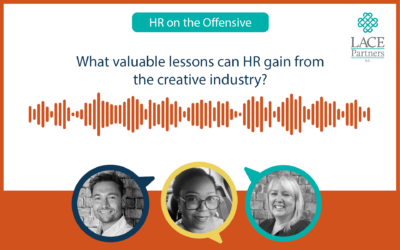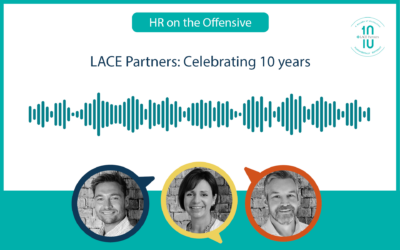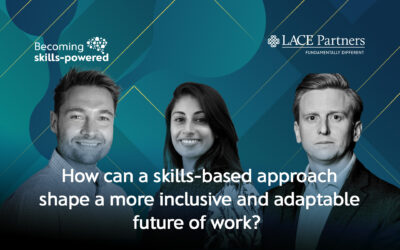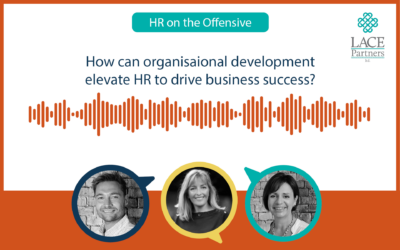Artificial intelligence (AI) is one of the most disruptive forces impacting businesses today, and it’s set to significantly alter the landscape of change management. We’ve recorded a number of podcasts in the last year looking at its impact from a holistic HR perspective and how organisations can be more pragmatic in their use of it in HR, we’ve also canvassed opinions about it from our friends like David Wilson from Fosway, but today we wanted to focus in on the impact for change management professionals. So we asked Jess Herniman and Ed Sparkes from our Change team to share how they think AI can transform the way change professionals work, but also how it can empower them to guide their organisation through the AI revolution.
AI: A Change Manager’s toolkit
AI offers a treasure trove of tools to enhance your change management arsenal. Here are some ways AI can enhance your efforts:
· Effortless efficiency: Gone are the days of writing tedious project updates, doing translations and grammar checking. AI can turn your notes into to-the-point updates, translate content swiftly and make sure the grammar is on point (here’s an example of ten translation tools that use AI)
· Persona power: AI can analyse data to create detailed user personas, helping you segment your audience, understand their motivations and frustrations, and give you insight on their preferred method of communication.
· Tailored messaging: AI allows you to build your messaging and tailor the tone of voice based on your knowledge about your specific audiences/personas – leading to higher engagement with your content (this link here gives more info on personalising employee communications).
· Sentiment analysis powerhouse: AI can rapidly analyse data from interviews, workshops and focus groups, uncovering stakeholder sentiment and pinpointing areas of challenges and opportunities. This allows for targeted interventions and ensures your change management strategy addresses specific needs. Here are some examples of focus group tools to explore.
· Risk and mitigation: Not only can AI help you identify typical risks related to change initiative but it’s a perfect partner to come up with ideas for meaningful mitigations – limiting the risk of any unwanted surprises.
· The future of training: AI can personalise and deliver bespoke training programmes (our friends at HowNow have been delivering this for years – here’s a little more info on the benefits), potentially taking on the role of a virtual personal trainer. Imagine delivering immersive, VR training experiences!
· The digital handshake: AI-powered digital assistants can guide users through new systems, be there to answer immediate questions and eliminate the need for extensive training sessions.
Beyond efficiency: The strategic shift
While AI automates tasks, the real power lies in its ability to empower you to become a more strategic change leader. The skill of the Change Manager becomes taking all that information [generated by AI] and making the right business-driven decisions.
While AI excels at automation and data analysis, the human element remains paramount in change management. AI is not going to replace us…building relationships, gaining trust, and influencing are all still critical. As a change manager your skills in relationship building, empathy, and strategic thinking will be even more valuable in the AI era.
Preparing your organisation for the AI shift
Change managers are instrumental in guiding an organisation through the AI transformation. Here’s how we can pave the way:
· Understanding impact: Spending time exploring the impact of AI on our industry and organisations, identifying where the biggest changes will happen and what the challenges and opportunities are.
· Demystifying AI: Raising awareness of AI’s capabilities and potential benefits.
· Leading by example: Encouraging leaders to invest in pilot projects to demonstrate AI’s practical applications.
· Beyond the hype: Moving past the “AI will replace your job” rhetoric. Focusing on real-world use cases that improve work and demonstrate the value AI brings to individuals.
· Data-driven decisions: Implementing a feedback loop. Using data and sentiment analysis to measure the effectiveness of AI implementation and continuously refine your approach.
· Adoption is key: Don’t let AI gather dust. Championing its use and demonstrating its value to stakeholders is critical.
One of the biggest hurdles to AI adoption is fear. It is important to address this head-on – address the fear throughout the change lifecycle, focus on the positive impact and the opportunities AI provides for both the business and the individuals.
The upskilling imperative
The future of work demands a new skillset. Upskilling your team and colleagues in AI literacy is crucial. Everyone, not just data specialists, should have a basic understanding of AI to leverage its capabilities effectively. As AI tackles the mundane, human creativity will flourish. Your ability to solve complex problems, think strategically, and build strong relationships will be more valuable than ever.
A call to action
The message is clear: embrace AI! If you are not using AI yet, that’s fine, but you will need to start using it soon. Start exploring how AI can enhance your productivity and effectiveness. For change professionals, the future is about fostering a positive mindset around AI, upskilling your teams, and guiding your organization towards a smooth and successful AI integration.






